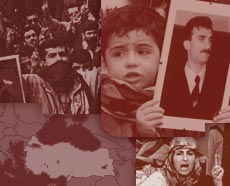
Nationalists Without a Nation

Nationalists Without a Nation
As with many political parties, the initials tell you little. The P.K.K., or Kurdish Workers' Party, is not about work. It's about nationhood. Its aim for more than 20 years has been the creation of a country for the world's 20 to 25 million Kurds, more than half of whom live in Turkey, the rest in Iraq, Iran and other neighboring countries. Roughly a million are in Europe, in exile or as migrants, the bulk of them in Germany.
The P.K.K., founded in 1978, began a guerrilla war against Turkey in 1984 from bases mainly in Syria and took the fight to Iraq after the Gulf War. Today it claims about 10,000 soldiers in its military wing, the Popular Army for the Liberation of Kurdistan. Its political face is the Brussels-based National Liberation Front of Kurdistan, plus a self-proclaimed Kurdistan parliament. The latter has recently caused alarm for the central government in Spain because the nationalist Basque regional government has invited the Kurdish parliament-in-exile to use its building for a meeting in July. Like most other NATO members, Spain does not want to offend Ankara, or upset its favorable trade balance with Turkey. Like most other European Union nations, it also pays at least lip service to the rights of Kurds, if only to avoid scenes like last week's.
As those events confirmed, the P.K.K. is well organized in Europe despite being outlawed in Germany and France. It has a strong propaganda arm, which includes the Kurdish television channel MED-TV, based in London. But its most visible face has long been Abdullah Ocalan, a hero to stateless Kurds and a hated terrorist to Turks. Ocalan, 49, said late last year he had little sense of national identity until he was a teenager, but was struck by the powerlessness of his poor, illiterate farming parents. He has risen from those beginnings to be far more than a mere party secretary-general; he has made himself a cult figure along the lines of his own hero, Vladimir Lenin. In December, he told the Italian daily Corriere della Sera: "A [legal] process against myself distinct from the Kurdish cause? That would be like separating the head from a body."
Ankara claims Ocalan has plenty of experience in such operations, blaming him for thousands of deaths in the 15-year war. The P.K.K. counters that its violence has been exceeded by that of the Turkish armed forces and that Ankara has fought a scorched-earth war against Kurds, razing thousands of their villages.
The P.K.K.'s campaign is made more difficult by the fact that, exiles aside, Kurds are dispersed across five national borders, and, although most are Sunni Muslims, they are not clearly united by one religion or one language, as are, say, the nation-seekers of Kosovo. For example, among the estimated 50,000 Kurds living in Britain, many among those of Iraqi origin were not nearly as angered as other Kurds over the arrest of the Marxist-Leninist, and therefore by definition non-religious, P.K.K. leader.
Recently, even before being made persona non grata by Syria, Russia and Italy, Ocalan had hinted at lowering the P.K.K. demands from sovereignty to autonomy. But although his vastly outnumbered soldiers are losing ground and Ankara now has him in custody, no one is predicting that the "Kurdish problem" will go away, whatever happens at Ocalan's trial. A loose ethnic community--the world's largest without the status of nationhood--is likely to become tighter if it is offered a martyr. Already far more Europeans recognize the initials P.K.K. than was the case only a week ago (in the middle of May of 1999).